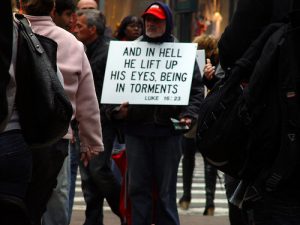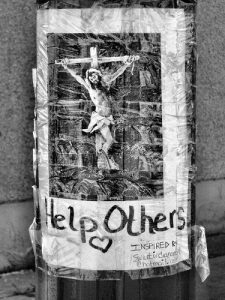Narrative Lectionary Reflection for the Fourth Sunday in Lent, Year Three
Lessons: Luke 16:19-31, Psalm 41:1-3 (or 41:1)
Theme: God’s faithful and generous people learn to see those in need around them, and they find their identity in whose they are rather than in what they have or seek to possess.
Key Scripture: There was a rich man who was dressed in purple and fine linen and who feasted sumptuously every day. 20 And at his gate lay a poor man named Lazarus, covered with sores, 21 who longed to satisfy his hunger with what fell from the rich man’s table; even the dogs would come and lick his sores. Luke 16:19-21
Preaching/Teaching Reflection
This week’s gospel lesson recounts the story of Lazarus and the rich man. Note that the poor man has a name, but the rich man who has used the tool of his riches for his own selfish purposes, and in the process continued  the suffering of Lazarus, remains unnamed in this story. We often assume that Lazarus lacks an identity, even though he has a name. He is, to the rich man, invisible until the rich man, now deceased and himself in need, has need for Lazarus. Suddenly Lazarus—beloved Child of God—is no longer invisible.
the suffering of Lazarus, remains unnamed in this story. We often assume that Lazarus lacks an identity, even though he has a name. He is, to the rich man, invisible until the rich man, now deceased and himself in need, has need for Lazarus. Suddenly Lazarus—beloved Child of God—is no longer invisible.
Could it be that in his sinful management of his wealth, it is the rich man who has lost his identity as God’s beloved child? Has he become invisible in the loss of all that gave him meaning and identity? Is it possible that in serving only himself and his desires, that the rich man and his kin (who evidently use money in much the same way) have lost their ability to hear a word of warning? The story is unsettling and speaks as strong a word today about our use of money and our love (or lack thereof) for our neighbors as it did to those who first heard this good news.
Wait! What good news? How is this news about a great chasm and Hades and suffering good news? Where’s the hope in this story? Is it found only in the truth that the poor and marginalized will find relief and comfort in eternity? That’s not satisfying. What about the rest of us poor sinners (and yes, most of us reading this are probably among the world’s wealthiest folk)? How does one stanch the mental flogging that may result as one is driven to the foot of the cross in painful recognition of one’s shortcomings, failures, and inability to put first that which really matters?
Let’s start by assuming that most of us are wealthy, at least by global standards. Even when one averages out the differences in the cost of living and wages, the majority of folks in the United States and similar nations are rich–flat out rich. Most of us have shelter, food, clothing, shoes, some form of transportation, the opportunity to pursue an education, and choice. Yep, we have plenty of choice, and that’s wherein the trouble often begins. The more one has, the more opportunities there are, and the more choices one has and must make. Add to this reality the fact that our culture operates from a perspective of scarcity and desire, and it’s easy to see how folks become confused, fearful, obsessed, and as a result downright stingy about their resources. In short, we all-too-easily buy into the lie of consumer culture: There isn’t enough to go around, and you’d better get your share because you deserve it.
However, as God’s beloved children the story of Lazarus and the rich man reminds us that every decision we make in response to God’s grace-full “YES” to us is about stewardship. We are entrusted with the right use of the amazing abundance God provides. There is enough (and then some) for all of us, but only if we are faithful in our use of resources, attentive to our neighbors’ needs, and keep our focus on the provider of all good things and our Lord and Savior. In living this way, we experience real life, and in this life the blessings pour forth so  that we have enough and plenty to share. All are invited to the table, to Christ’s table, where all are fed and where no one is turned away.
that we have enough and plenty to share. All are invited to the table, to Christ’s table, where all are fed and where no one is turned away.
Listen up, dear people of God. You are not invisible to your creator, and neither are your neighbors. We will not find our identity within the malls and halls of consumer culture or by shame, guilt, or duty. Instead, our identity comes through love, by seeing one another as we really are–broken, beautiful, and created in God’s image–and affirming the wealth that comes though that alone. In community we can affirm one another, find common ground, assure one other that there is enough when we trust, share, and care, and learn to hold lightly as the good things of God come into our possession and flow forth in a river of goodness that sustains this weary world. We do have true wealth, you and I. We have Jesus. We are loved. And we have the beloved community in which to learn, worship, grow, and serve with glad and generous hearts. This is the good news in the story of Lazarus and the rich man, but like our neighbor, we have to see it to experience it.
In Worship
Consider using the story of the rich man and Lazarus to talk about the invisible poor. How could the rich man have passed Lazarus every day and not ever have seen him? It seems so obvious, but we do it today, too. Invite people to ponder who they do not see in their neighborhoods and communities. Does Lazarus sit right outside the congregation’s doors? Or could Lazarus even be sitting in the same pew? If you have the ability to project images and text, consider showing images of poverty from your own community, state, country, and world. Talk to people in your community who serve those on the edge. What are the stats for your community? How many children receive free and reduced lunches at your local elementary school? How many elderly are food insecure?
How might you link this thread with the hymn “You Satisfy the Hungry Heart”? We are fed at Christ’s table so that we may go out to feed a hungry world. Pay particular attention to the fifth verse: “You give yourself to us, O Lord; then selfless let us be., to serve each other in your name in truth and charity.”
With Youth
The rich man refused to share his food with Lazarus, the poor man right outside his gate. Most of us today wouldn’t be this overt in withholding nourishment from the hungry. Yet do we hurt the poor and the hungry through other, more subtle means? You might want to use this article “Pope Francis says wasting food is stealing from the poor” from the June 5, 2013 online edition of The Telegraph for comparison. Invite youth to make connections in their own life and cultural context between the story of Lazarus and the rich man, what Pope Francis says, and what other religious leaders have to say about wealth, justice, poverty and our response to it.
With Children
Psalm 41:1-3 has some interesting words about how to be happy. Invite the children first to tell you what they think it means to be happy. Entertain all answers. Then read them the three verses from Psalm 41 and ask them what these verses say are the way to be happy. According to these verses, being happy (or content) comes not in what we have but in how we treat others—those who are poor, weak, and suffering. Invite the children to think of ways they can help those who are poor or homeless. If you have time and resources, have them assemble simple “Blessing Bags” that can be distributed to homeless neighbors. Use quart size zip-lock bags and fill them with a hand towel, soap, and wash cloth, as well as healthy snacks and travel size toiletries. Have them write a simple note of encouragement or draw a picture to include. “Bless” the bags and take them to wherever the homeless in your community gather for meals or shelter.
Weekly Stewardship Bulletin Insert
As faithful stewards of God’s abundance, we are called to examine our decisions and choices about right use of resources so that we do not render our neighbors invisible or without value. All of God’s beloved children have value and worth, and our truth wealth is reflected not in what we have but in whose we are.
Stewardship at Home
How can you see the invisible poor in your area? They may be the minimum wage workers in retail or fast food jobs, people who clean office buildings, or the elderly who survive on meager social security benefits and Meals on Wheels. How hard is it to see the dignity and worth in those people we may take for granted every day? What might you do this week to get to know someone who is living in poverty, to forge a relationship based on mutual dignity and common hopes, dreams, and faith? Start by reading this article.
Photos: Cea, Joe Campbell, and striatic, Creative Commons. Thanks!
Note: Reprint rights granted to congregations and other church organizations for local, nonprofit use. Just include this note: “Copyright (c) 2017, Rev. Sharron Blezard. Used by Permission.” Other uses, please inquire: thewritelife@hotmail.com.




Leave a Reply